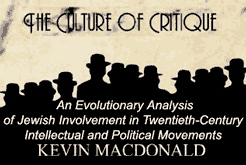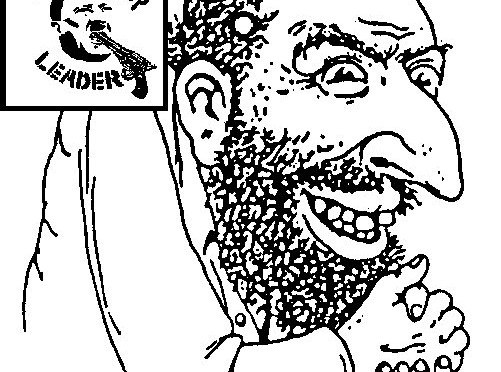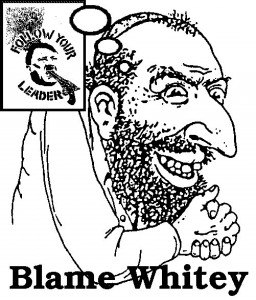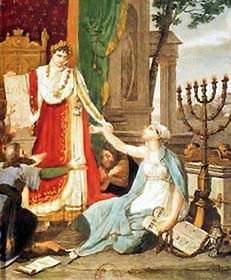 Below are some excerpts from a review by PLEASUREMAN, The Culture of Critique – My Posting Career (original emphasis):
Below are some excerpts from a review by PLEASUREMAN, The Culture of Critique – My Posting Career (original emphasis):
When I started reading Kevin MacDonald’s The Culture of Critique, I didn’t quite know what I was getting into. John Derbyshire was warned about people who get “the Jew thing”, and as I mentioned in Who’s Afraid of Kevin MacDonald? his own review of MacDonald’s work more or less pretends that the last 40 years of major Jewish influence on conservative politics never happened. It’s one thing to find this influence an overall positive thing, but to forget to mention that it happened strikes one as careless, especially when reviewing a work that discusses just this influence.
If conservatives are not introspective it follows that they are not closely focused on the permutations of conservatism that go beyond policy debate, including the permutations that lead to conservatism’s dark side. This dark side includes a tendency towards authoritarianism, close-mindedness, and paranoia. Liberalism has its extremism, conservatism has its dark side. It would be naive to fail to acknowledge this dark side when approaching controversial work like MacDonald’s. Unlike Herrnstein and Murray’s The Bell Curve, The Culture of Critique is not anchored in decades of irrefutable science, it is a more at a theory that attempts to explain Jewish dominance in Western academia, politics, and business. Moreover it is a theory tied to an already controversial idea, that ethnic groups can have an unconscious or subconscious group evolutionary strategy which benefits not merely the individual but the group itself. This goes beyond the normal attachment one feels for one’s nationality or ethnicity, and suggests that genetics and culture can interact in such a way that the result is justifiably called an evolutionary strategy.
But more than that, MacDonald’s scholarship is in what contemporary culture defines as forbidden territory. It must stand in the shadow of a malevolent lunatic fringe that has always followed conservative thought–a fringe that finds Jewish (and other) conspiracies everywhere, lives in fear of sinister forces, and rages impotently about everything it sees as a potential threat. There is no way to approach the question of Jewish influence without both conjuring this fringe and finding oneself accused of sympathy with it.
In my view, MacDonald’s incisive work is worth reading whether you are prepared to believe in a group evolutionary strategy or not, whether you believe Jewish influence has been pronounced or not. Even if MacDonald is completely wrong, his approach to groups deserves attention, particularly with regard to the ongoing transformation of American political life from a culture formed and guided by Northern Europeans to one that is approaching complete ethnic pluralism. I think it is likely that Jewish culture, as it has been shaped over the millenia, has worked to reinforce a set of behaviors, beliefs, and strategies with regard to other groups (and particularly with the universalist-minded West), and whether it is driven by evolutionary forces is beside the point–it nevertheless is, and has been strikingly influential upon the events of the 20th century. Indeed, it has changed the course of American history.
My initial goal here is to summarize MacDonald’s arguments and evidence, by chapter. This post is an introduction, and subsequent posts will take the chapters in sequence.
As Henry Ford remarked about Charles Lindbergh, “When Charles comes out here, we only talk about the Jews.” Get ready to talk about the Jews.
MacDonald next mentions Stephen Jay Gould, whose long record of intellectual prevarication on the subject of genetic differences (and human biodiversity in particular) speaks for itself. Gould has been an incredibly important figure in the demonization of psychometrics and his book The Mismeasure of Man is virtually a bible for what one might term the anti-intelligence clergy (intelligence doesn’t exist, cannot be measured, is not variable, etc). According to MacDonald, Gould’s views were influenced by his Jewish-Leftist identity and fear of anti-Semitism.
Gould made exaggerated and provably false claims about the congressional debates of the period. The immigration debate was largely about preserving America’s Nordic-derived identity and culture, and IQ testing did not play a significant role in any part of it. Gould’s response to such criticism was to ignore it, a response that has become a tradition among Gould’s worshipful and ill-informed followers. (Similarly, Gould ignored all modern IQ research on the ludicrous grounds that it was “ephemeral”.) A revised edition of The Mismeasure of Man essentially ignored all critical response to Gould’s book.
Gould further claimed that the 1924 immigration law was in some sense responsible for the deaths of Jews unable to emigrate from German-held territories before World War II, a hyperbolic and frankly hysterical conclusion that has become typical of Jewish anti-intellectualism. This rhetorical behavior is readily found in much Jewish political output, and MacDonald catalogues the varieties of it found in Gould’s work, including use of denigrating labels, oversimplified straw men, gilded writing, and perhaps the most popular technique, claiming moral superiority over one’s debate opponents. Nevertheless, Gould maintains a high level of posthumous prestige.
The Culture of Critique – My Posting Career – Page 2:
A response to The Culture of Critique
I was going to canvass some of the responses to MacDonald’s book, but why not just quote from the SLPC’s considered, measured review:
SPLC:
Kevin MacDonald is the neo-Nazi movement’s favorite academic. A psychology professor at California State University, Long Beach, MacDonald, who also is a board member of the white supremacist Charles Martel Society, published a trilogy that supposedly “proves” that Jews are genetically driven to destroy Western societies. MacDonald also argues that anti-Semitism, far from being an irrational hatred for Jews, is a logical reaction to Jewish success in societies controlled by other ethnic or racial groups. After the publication of a 2007 Intelligence Report exposé detailing MacDonald’s anti-Semitism, his teaching duties were reduced and many of his colleagues publicly condemned his racist research.
This is, as you have seen in my summary of MacDonald’s book, wholly malicious, tendentious, and dishonest. But we expect nothing less from the SPLC, a Jewish dominated organization that carefully manages its Wikipedia page to remove any hint of criticism. The SPLC is fixated on white supremacist groups but has of late broadened its scope to include any right-wing rhetoric that is more arousing than David Brooks after a bong hit. It doesn’t have any serious charter to pursue hatred as such, or else it would have to monitor itself for its flamboyant belligerance and crude bullying and coercion.
It may as well be said that this type of aggressive, moralistic posturing is a signature of Jewish rhetoric. It has such a long tradition that it must be recognized by everyone today as the sort of thing Jews often do–it is a hallmark, for example, of arguments in favor of Israel’s right to do everything, and was used extensively by neocons to justify the Iraq War.
This manner of argument is in keeping with Judaism’s aggressive competitive tendencies, high Jewish IQ, and legalistic morality. I add the last item because legalistic moral systems must of necessity be rigid. They are based on the idea that goodness is not arrived at by communal judgement (favored in altruistic societies), but by command of authority–and here the difference with Christianity could not be more striking. As I have noted in another context, much of the behavior we see today is premised on the notion that what is legally permissable is morally permissable–a statement very pregnant with meaning, and very much an inheritance from Jewish thinking, whether we realize it or not.
And what about The Culture of Critique? MacDonald chose his title well–Jewish culture is very tied up in the idea that argument, even tendentious argument, is good. I am not sure I follow him in his belief that Jewish behavior is an evolutionary adaptation–but let me qualify this. The idea of group evolutionary behavior remains controversial. There is some question as to how it operates through natural selection; I am not expert enough to present either side of this question. But then I suspect that the interaction between culture and natural selection is rather murky and difficult to quantify, much as most mixed nature-nurture traits are.
It is quite possible that characteristic Jewish culture was formed by happenstance–that is, it was shaped by the unique series of events and struggles it found itself in due to its place and time of origin and adjacent cultures. As a firm believer in the role that randomness plays in all life, I am not convinced that an explanation of cultural thinking must be any less arbitrary than this.
This remains an academic question because we can never develop a rigorous and falsifiable theory–we are left to believe what we will. But however it came to be, Jewish culture as it is today is a compelling force that has dramatically changed Western culture.
Perhaps a more interesting line of argument is that Jewish culture is a byproduct of high IQ. The pursuit of pluralism, for example, can be seen as Jewish defensiveness given its competitive nature–but it is also the mark of high IQ novelty seekers. Similarly, many of the ideological movements that MacDonald surveys had little trouble attracting gentiles of a certain type, however dominated their upper ranks may have been by Jews. And by “certain type” I am referring to the cognitive elite–the class of person who is readily won over to abstract theories and is disdainful of traditional practices. That Jews dominate may have less to do with Jewish culture and more to do with Jewish IQ. One omission MacDonald makes is in comparing Jewish achievement and wealth without controlling for IQ.
However this book is an impressive survey of Jewish involvement in the great changes of the 20th century. Wherever one comes down on this subject, it deserves better than the SPLC’s malicious and disingenuous treatment, or the cool oblviousness of most of the rest of Western society. It opens the door to many fascinating questions, not only to Jewish culture but to the whole nature of Western civlization and its potential downfall, to the study of group interaction, to the contrast between impermeable and assimilationist societies. It is a serious and manifestly well-intentioned academic work.
And for that reason, the reception of MacDonald’s work should be considered scandalous. We do not live in a freely thinking society if this careful and conscientious exploration of group behavior is beyond the pale. But then, looking around, one can readily see that we in fact live in a society governed by frivolity, snark, and clownishness–clownishness much like the SPLC’s ridiculous summary of MacDonald’s study of Jewish culture. Such is our intellectual world.
I do not agree with MacDonald that ethnic separatism offers European-derived culture anything more than devolution. I think ethnic separatism within a diverse nation will alter what we think of as Western culture and turn it into something no better than the self-interested ethnic enclaves that have exploited it. Universalism is simply a hallmark of the West; if it loses this trait, it loses itself.
The question of what to do is far too complicated to explore briefly, but a return to assimilationism and a renewal of Western values must be the only plausible course. All of our politics should be subordinate to this issue.
The Culture of Critique – My Posting Career – Page 3:
It’s sometimes used as an excuse that Jews even criticize themselves, without acknowledging that Jewish self-criticism is aimed at increasing cohesion by punishing deviation (such as intermarriage), while Jewish criticism of other cultures is aimed at undermining cohesion. It is silly to equate the two.
Kevin MacDonald:
I do think that the social tensions resulting from this assault on our people and culture will eventually get to the point that there will perforce be an audience for my work. It may seem odd to phrase it this way, but in a real sense all of us writing from a pro-White, pro-European perspective should be desperately trying to break through into the wider culture — to become famous and respected. If it doesn’t happen for any of us, then we have surely lost.
Referring to an interview with Kevin MacDonald by Alex Kurtagic:
http://www.wermodand…0220110000.html
The treatment of MacDonald shows the ugliest side of Jewish culture, particularly because the venue is academia. For me it is a reason I can never feel sympathetic toward Jewish concerns or Jewish claims of injustice; their culture is very hospitable to injustice and quite glibly so.
 Donald Trump’s Political ‘Pit Bull’: Meet Michael Cohen:
Donald Trump’s Political ‘Pit Bull’: Meet Michael Cohen:





